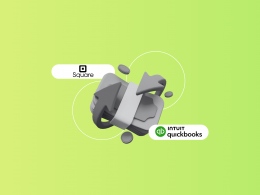Accounting is important for any business, but it can get particularly complicated for an e-commerce business, partly due to complicated inventory management and other challenges associated with the industry. E-commerce accounting involves many steps, including organizing financial data, creating financial reports, and analyzing data.
In this article, you’ll find details of various aspects of e-commerce accounting and why those functions are important.
Importance of accurate financial tracking
An e-commerce business needs to track not only sales numbers but all expenses. Except the costs associated with sourcing the product, expenses for an e-commerce business also include:
- Inventory storage costs;
- Platform or hosting fees;
- Shipping costs including packaging materials;
- Bank fees;
- Item returns;
- Insurance costs;
- Employee costs (if applicable);
- Utilities;
- Taxes.
It’s important to categorize these expenses accurately so that you know exactly where your money is going. If you’re accounting for everything, you can try to find ways to reduce your overall expenses. While if you don’t know your numbers, you have nothing to analyze to find ways to improve.
In terms of tracking income, you need to categorize your sources of income, such as income per product. By doing so, you’ll also know your profit margin for each product, and will be able to adjust all your prices accordingly.
These expenses and sources of income need to be tracked both for tax purposes, and better understanding of your true profit margins. If your profit margin is narrow once you calculate all your expenses, you may need to adjust your prices. You can use a markup formula to find the prices that will give you a more industry standard profit margin.
Learn how to categorize your expenses in QuickBooks Online automatically.
Tax compliance
E-commerce accounting allows you to stay in compliance with tax laws and deduct all your expenses so that you can keep your tax bill at a minimum. It keeps your data organized, simplifying your tax filing process, particularly if you use accounting software.
But e-commerce businesses also have to deal with sales tax laws, which are complicated, particularly for e-commerce. Proper accounting will help you track your sales and show you when you’re required to collect sales tax. It also enables you to track sales tax collected so that you can pay it correctly when it’s due. As we all know, non-compliance with tax laws can be costly, and entail hefty penalties, fees, and interest.
Check out our list of best tax preparation software to find the right tool for your e-commerce business.
Inventory management
Tracking your sales and expenses helps you determine the inventory that you should have at any given time. Holding too much inventory means more cash not in your pocket, and not enough inventory leaves orders unfulfilled or delayed.
Accounting for inventory also involves tracking your sales by product so that you know how much of each product you should have in your inventory and can make purchases accordingly.
It also may uncover products that aren’t selling well or aren’t profitable. The demand for some products may even be obsolete, so you’ll know what not to purchase further.
In other words, you’ll know which products are making you money and which aren’t. If you do find that you have slow moving or obsolete inventory, you should offer it at sales prices so that you’re not holding dead stock and can recover at least part of your costs.
Inventory accounting can also help you make sure that your actual inventory matches your records. If they don’t match, you’ll need to investigate to find out where the discrepancies lie and if you have a theft issue.
As you can see, inventory accounting and management are an important part of cash flow management, which we’ll cover next.
Find out how to create the best inventory management system and check the list of small business inventory software solutions.
Cash flow management
Cash is king in any business. You have to know how much cash you’ll have on hand at any given time so that you can meet your obligations, which makes cash flow forecasting an important part of your accounting process.
Cash flow forecasting is generally done on a 12-week schedule, tracking your actual cash inflows and outflows on a rolling basis. It can tell you where you might have cash shortfalls, but also how you can improve your cash flow.
There are three main elements of cash flow management – inventory, accounts receivable, and accounts payable.
Let’s point out again that it’s vital to keep your inventory at the optimal level so that you can fulfill orders but not have too much cash tied up. Finding that level can only be done by accounting properly for all your sales by product.
In terms of accounts receivable, you want to make sure that you’re collecting money owed to you as quickly as possible. Accounts receivables are cash not in hand, so you have to set strict time limits for receiving payments. You’ll also need to make additional effort to collect overdue payments.
Accounts payable require the opposite strategy. You want to keep as much cash in hand for as long as you can, so you should negotiate terms with your suppliers to have a longer period of time to make a payment. You might want to prolong that time as much as possible without incurring penalties.
All in all, proper accounting gives you the information you need to create and analyze your cash flow forecast.
Learn what a clearing account is and how to use it for e-commerce business purposes.
Financial statements
Accounting allows you to create financial statements, which give you much valuable information about how your business is doing. Financial statements are also necessary if you try to obtain funding from a lender or an investor.
There are three main types of financial statements.
- Profit and loss statement: It’s a record of your income and expenses for the reporting period, and shows your net profit.
- Balance sheet: This statement shows your assets, liabilities and equity at any given point in time, which is the net worth of your business.
- Cash flow statement: It presents your cash inflows and outflows during the reporting period and your ending cash balance.
You should generate these reports at least annually, but often it’s good practice to do your reporting quarterly or even monthly so that you can analyze your statements and look for areas of improvement.
Find out how to ease financial reporting with Synder.
Budgeting and forecasting
Perhaps most importantly, e-commerce accounting helps you forecast your sales and create a budget.
Accounting for your sales gives you historical data that you can use to predict your sales going forward. You should even be able to project your sales by month based on your historical sales performance. Your forecast will tell you not only how much you should plan to make, but what additional resources you may need to support the business at each sales level.
Your forecast and accounting can then help you create your budget based on historical data. You should know what expenses you have at various sales levels to have an ability to predict your expenses in line with your sales forecast. Your budget is critical – without proper forecasting, you won’t be prepared for potential budget shortfalls.
A budget helps you plan and strategize so that you’ll have enough resources to meet your obligations to fulfill orders and keep the company running.
As you can see, without thorough accounting, you won’t have the information you need to create accurate forecasts and budgets.
Read more about financial forecasting and its importance.
KPIs
Accounting also involves calculating your key performance indicators (KPIs). An e-commerce business owner needs to track several KPIs including:
- Your website conversion rate – how many visitors take a desired action;
- Cart abandonment rate – how many visitors add items to cart and leave before completing a purchase;
- Your customer acquisition cost – how much do you have to spend to acquire one customer;
- Average order value – how much does each customer spend;
- Customer lifetime value – how much will you make from each customer for the duration of your relationship with them;
- Net profit margin by product.
These metrics are all measures of your success. Accounting gives you these KPI numbers, which will show you where you’re doing well and where you’re not. You should compare your KPIs to industry standard KPIs to see if you’re below where you should be.
This allows you to take specific measures to improve your KPIs and therefore, your overall performance. You’ll also have the key data that will allow you to make informed decisions.
By analyzing your KPIs you may also be able to identify trends, such as months in which your conversion rates are lower. This might lead you to take more effort during those months to stimulate sales.
Overall, KPIs help you focus on what matters most to your business. By identifying the most important metrics to track, you can prioritize your efforts and ensure that you’re allocating resources effectively. Be sure to monitor your KPIs monthly. If you take appropriate actions, you should see your KPIs improve over time.
Learn the benefits of data analytics for e-commerce businesses.
Final thoughts
Accounting in an e-commerce business can be complicated and has nuances that accounting in other businesses does not. Unless you have a background in accounting and understand those nuances, your best bet is to either purchase e-commerce-specific accounting software or to outsource the services of an accountant that has experience in e-commerce.
In any case, don’t overlook the importance of accounting for your e-commerce business. Doing it right is critical to your success!






